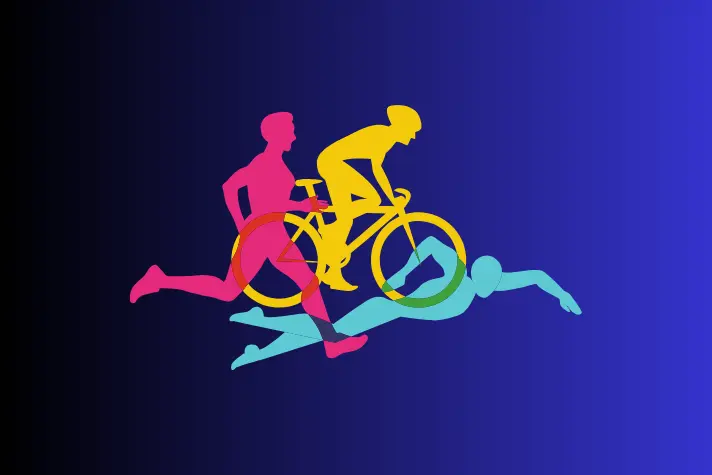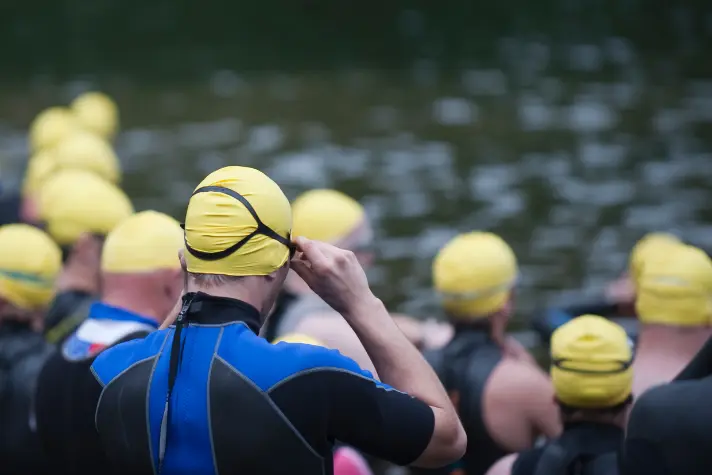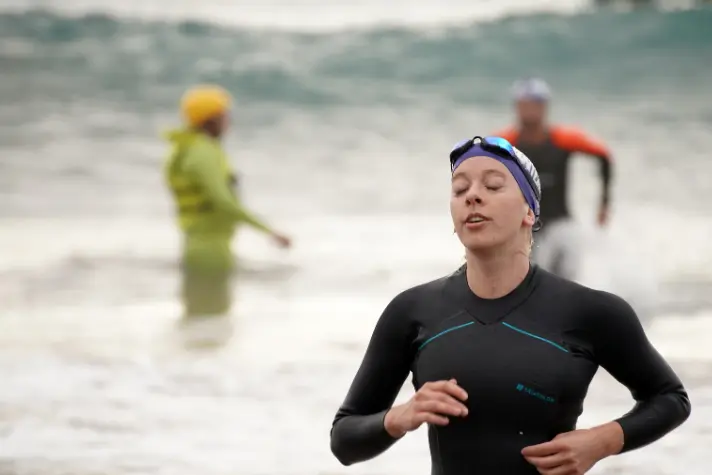
The allure of the triathlon, with its grueling trifecta of swimming, cycling, and running, resonates profoundly with the athletic-minded. This feat of endurance captivates countless individuals seeking to push their physical and mental boundaries.
Triathlons are not just races; they are a testament to human resilience, a pursuit of peak performance, and a welcoming community of like-minded people. For those drawn to the call of endurance sports, the triathlon is a pinnacle of aspiration, combining testing physical fitness with the transformative journey of personal growth.
Triathlon is exploding with interest for many reasons, and people from all walks of life are finding inspiration in taking on such multisport endeavors.
Let’s explore some of the many reasons why individuals are taking up triathlon as a new pursuit in life.
1. Physical Fitness
Triathlons stand at the summit of physical endurance, offering a full-body workout that is unparalleled. Studies indicate that individuals engaging in triathlon training experience significant improvements in cardiovascular health, muscle tone, and body composition.
The cross-training effect of mastering three disciplines reduces the risk of overuse injuries and promotes balanced muscle development. Athletes are often drawn to the sport for the comprehensive fitness it cultivates.
Swimming builds upper body strength, cycling develops leg power and endurance, while running enhances stamina and agility. The symbiotic relationship between these exercises makes triathlon not just a sport, but a holistic fitness regimen.
2. Personal Growth and Accomplishment

Embarking on the triathlon journey often aligns with the pursuit of personal milestones. Completing a triathlon is no small feat, and the sense of achievement is profound. Research suggests that goal completion in such challenging endeavors is associated with heightened self-esteem and personal satisfaction.
For many, the training process itself, marked by setting and surpassing personal bests, becomes a vehicle for continuous self-improvement. Athletes find in triathlon a tangible measure of their growth, as each race and each session reflects their commitment to self-betterment.
3. Mental Toughness and Wellbeing
The mental fortitude required for triathlons is often as demanding as the physical challenge. Engaging in triathlons has been linked to improved mental health, as noted by a 2018 study in Frontiers, which found that endurance sports can reduce symptoms of depression and anxiety.
The clarity of focus and discipline needed to succeed in such multisport events fosters mental toughness that transcends the race itself, equipping athletes with resilience that permeates other areas of life.
Moreover, the meditative repetition of training can be a form of moving mindfulness, promoting overall psychological well-being.
Read also: Top 5 Training Secrets for Athletes
4. Variety in Training
The triathlon’s diverse training regimen is a powerful draw. Unlike sports that specialize in one activity, triathlon training encompasses swim, bike, and run sessions, keeping the routine fresh and engaging. This variety not only keeps boredom at bay but also promotes a broader range of physical capabilities.
Triathlon allows for flexibility in training schedules and helps athletes recover from one discipline while training in another. Such cross-training diversity can prevent burnout and keep motivation high, making it a particularly appealing aspect of the sport.
5. Community and Social Benefits

The triathlon community is renowned for its inclusivity and camaraderie. Events often bring together people from diverse backgrounds with a common goal, fostering a supportive network. Many studies have shown how participation in sports events like triathlon generates a sense of belonging and community among competitors.
For many athletes, the social interactions and friendships formed through the sport are as rewarding as the physical benefits. Local and online triathlon coaching platforms also add a layer of social accountability and structure. This supportive network not only motivates participants to persevere in their training but also enriches their sporting experience with a profound social dimension.
6. Proving Something to Oneself
Triathlons are a powerful platform for self-validation. For many athletes, the allure of the sport lies in the personal challenge it represents — a chance to prove to themselves what they’re capable of achieving.
Crossing the finish line is often a deeply personal moment of affirmation, a loud statement that they can set and conquer lofty goals. This endeavor is a journey of self-discovery, where individuals learn about their strengths, weaknesses, and the resilience of the human spirit.
The internal dialogue that accompanies the rigorous training and competition is a narrative of self-improvement and determination.
7. Stress Relief

Physical exertion, particularly in the form of endurance sports like triathlons, is an excellent way to alleviate stress. The rigorous physical activity involved in triathlon training releases endorphins, the body’s natural mood elevators. The repetitive nature of swim-bike-run workouts can be meditative, offering a mental break from daily stressors.
This cathartic release has been shown to improve mood, decrease anxiety, and foster a general sense of well-being.
Moreover, the structure and routine of triathlon training provide a focus and purpose that can mitigate the chaos of everyday life, serving as a potent form of stress relief.
8. Weight Loss
For individuals aiming to manage their weight, triathlons present an attractive proposition. The sport is highly effective at burning calories and increasing metabolic rate not just during, but also after exercise. The training involved is diverse, which can prevent plateaus in weight loss that often come from repetitive workout routines.
The combination of high-intensity interval training (found often in run and bike workouts) with steady-state endurance workouts (like long swims or rides) creates a varied metabolic demand, which can be more effective for weight loss compared to single-modality exercise routines.
9. Reduced Injury Risk
While any sport carries a risk of injury, triathlon training inherently includes a form of cross-training that can reduce the likelihood of overuse injuries. By spreading the physical demand across swimming, cycling, and running, triathletes avoid overstressing one set of muscles, joints, and ligaments.
This balanced approach to training allows for more complete recovery, as one can rest certain muscle groups while still training others. Additionally, the low-impact nature of swimming offers a respite for the joints, complementing the more high-impact disciplines of running and cycling.
10. Sense of Badassery
There’s an undeniable cool factor to being a triathlete. Completing a race that includes an open-water swim, a strenuous bike ride, and a punishing run, sometimes all before lunchtime can certainly make one feel invincible. This “sense of badassery” is a unique psychological benefit that comes with the territory.
It’s not just about the physical accomplishment, but also the mental fortitude to endure and the courage to persistently push one’s limits. The awe and respect garnered from peers both within and outside the triathlon community add to this empowering sense of self and can be incredibly motivating.
About The Author:
Tyler Tafelsky is an endurance athlete and blogger at BetterTriathlete.com. In addition to writing about sports like cycling, running, and triathlon, Tyler also competes in ultra-distance cycling races at the professional level.


![[Infographic] Life with Acne: Managing and Embracing Healthy Skin Habits Life with Acne](https://www.safeandhealthylife.com/wp-content/uploads/2023/10/Life-with-Acne-150x150.webp)

